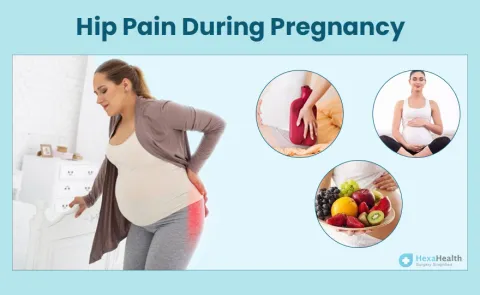Itching During Pregnancy - What to Expect, Causes, Treatment

Quick Summary
- Itching during pregnancy is a common complaint
- Mild itching is considered normal, but excessive or persistent itching can be a cause for concern
- It is important to know the potential causes and symptoms of body itching during pregnancy and seek medical advice if necessary
Itching during pregnancy is a common complaint among expectant mothers. While mild itching is considered normal, excessive or persistent itching can be a cause for concern. It can be uncomfortable and distressing, but it can also indicate an underlying condition that needs to be addressed. It is important to know the potential causes and symptoms of body itching during pregnancy and seek medical advice if necessary.
This article will focus on itching in pregnancy, including its causes, symptoms, and treatment options. We will also explore potential complications and prevention strategies. If you are experiencing itching during pregnancy, it is important to understand what to expect and when to seek medical attention.
With that in mind, let’s delve deeper into itching during pregnancy and learn more about what to expect.
What is itching during pregnancy?
There are several types of itching during pregnancy, including full-body itching during pregnancy, which is also known as pruritus gravidarum. This type of itching can occur anytime during pregnancy and can be particularly uncomfortable for expectant mothers.
Itching during pregnancy can also be localised, affecting a specific body area, such as the abdomen, breasts, or thighs. This type of itching is usually due to the skin stretching as the baby grows. Regardless of its type, it can be distressing for expectant mothers. It is important to understand what causes itching in pregnancy and when to seek medical attention.


Causes of itching during pregnancy
Itching during pregnancy is a common symptom that affects many women. There are several potential causes of itching during pregnancy, including:
- Hormonal changes
- Hormonal changes during pregnancy can cause a variety of symptoms, including itching. Fluctuations in the levels of oestrogen and progesterone can affect the skin’s moisture balance, leading to dryness and itching.
- Additionally, hormonal changes can cause changes in blood flow, which may contribute to itching.
- Stretching skin
- As the uterus expands during pregnancy, the skin on the abdomen and breasts may stretch, leading to itching.
- This type of itching is usually localised to the affected area and tends to improve as the skin adjusts to the changes.
- Liver and kidney issues
- Sometimes, itching during pregnancy may indicate an underlying liver or kidney issue. Cholestasis of pregnancy, a liver disorder that impairs bile flow, is a common cause of itching in the third trimester.
- Kidney problems like chronic kidney disease or urinary tract infections can also cause itching.
- Itchy rashes or bumps
- Pruritic Urticarial Papules and Plaques of Pregnancy (PUPPP) is an itchy rash that develops around stretch marks during late pregnancy. Crusty, itchy bumps, called Prurigo, can also cause itching during pregnancy on the abdomen, arms, and legs in any trimester.
- Allergies
- Pregnancy can make some women susceptible to allergies, which can cause itching. Allergies to foods, medications, or environmental triggers may lead to skin irritation and itching.
- Infections
- Infections, such as yeast infections or sexually transmitted infections, can also cause body itching during pregnancy. These infections can cause irritation and inflammation in the genital area, leading to itching and discomfort.
Symptoms of itching during pregnancy
Itching during pregnancy is a common symptom, especially in the later stages of pregnancy. It can manifest in several ways. Here are some common symptoms:
- Itching on the abdomen, breasts, thighs, or other areas of the body
- Redness and inflammation around the affected area
- Dry, flaky skin
- Rash or hives
- Bumps or blisters
- Darkened skin in the affected area
- Intense itching that interferes with daily activities or sleep
- Itching that is worse at night
Prevention of itching during pregnancy
There are several ways to prevent or manage itching during pregnancy. Here are some effective strategies:
- Diet and nutrition
- Eating a balanced diet with essential vitamins and minerals can help prevent itching during pregnancy. Foods with antioxidants and omega-3 fatty acids can help reduce inflammation and protect the skin.
- Therefore, your diet should include plenty of fruits, vegetables, lean protein, and healthy fats. You should also drink plenty of water and other fluid to stay hydrated.
- Skincare routine
- A good skincare routine can help to prevent and manage itching during pregnancy. Choose gentle, fragrance-free products that are designed for sensitive skin.
- Avoid using hot water, which can exacerbate dryness and itching. Instead, opt for lukewarm water and mild soap. Be sure to moisturise regularly to keep your skin hydrated.
- Regular exercise
- Regular exercise can help reduce stress, improve circulation, and promote healthy skin.
- Choose low-impact exercises like walking, swimming, or yoga. Consult your healthcare provider before starting any new exercise routine during pregnancy.
- Avoiding triggers
- Certain triggers can exacerbate itching during pregnancy. These may include exposure to heat, hot water, or harsh chemicals.
- Be sure to avoid these triggers as much as possible. You may also want to avoid tight-fitting clothing, which can irritate the skin.
By following these strategies, you can reduce your risk of experiencing itching during pregnancy and manage any symptoms that do occur. If you experience persistent or severe itching, speak with your healthcare provider to determine the underlying cause and develop an appropriate treatment plan.
Treatment of itching during pregnancy
If you are experiencing itching during pregnancy, several treatment options are available to help alleviate your symptoms. Itching in pregnancy treatment may include home remedies, medications, lifestyle changes, and medical procedures. Some of the most effective options include:
Home remedies
Several home remedies can help alleviate itching during pregnancy. These may include:
- Applying a cool compress to the affected itchy area
- Taking a cool bath with oatmeal or baking soda
- Using a humidifier or a fan to keep the air moist and cool
- Applying aloe vera gel or calamine lotion to the skin
- Avoiding scratching, which can worsen itching and cause damage to the skin
Lifestyle changes
Certain lifestyle changes can also help alleviate itching during pregnancy. These may include:
- Wearing loose-fitting, breathable clothing
- Avoiding exposure to heat, which can exacerbate itching
- Keeping your skin hydrated by moisturising regularly
- Managing stress through relaxation techniques, such as deep breathing or meditation
Medications
- In some cases, medications may be necessary to alleviate itching during pregnancy.
- The healthcare provider may recommend over-the-counter or prescription medications, such as antihistamines, corticosteroid creams, or topical numbing agents.
- You must consult a healthcare provider before taking any medications during pregnancy, as some may be harmful to your baby.
Medical procedures
In rare cases, medical procedures may be necessary to alleviate itching during pregnancy. These may include:
- Blood tests to check for liver function and other potential underlying causes of itching
- Delivery of the baby, in cases where the itching is severe or persistent and poses a risk to the health of the mother or baby
- Treatment for an underlying medical condition, such as cholestasis or eczema
Itching during pregnancy can be uncomfortable, but it is usually not a cause for concern. By following these treatment options, you can alleviate your symptoms and protect the health of you and your baby.
When to consult a doctor?
If you experience itching during pregnancy, it is important to talk to your healthcare provider. They can help identify the underlying cause of your symptoms and recommend appropriate treatment options to alleviate your itching. You should get immediate medical attention if you experience the signs and symptoms of conditions such as cholestasis, PUPPP, or Prurigo.
Signs of Cholestasis
- Intense itching, including itching in the feet
- Jaundice
- Nausea
- Dark urine
- Light stool
- Lack of appetite
- Depression
Signs of PUPPP
- Scattered itchy bumps or rashes on or near the stretch marks on the belly
- Blisters around the rash
- Itching that becomes worse at night
Signs of Prurigo
- Itchy, crusty bumps on the abdomen, arms, or legs
Takeaway
Itching during pregnancy is a common symptom that affects many women. While it can be uncomfortable, it is usually not a cause for concern. However, in some cases, itching may indicate an underlying condition that requires medical attention. The causes of body itching during pregnancy can vary, including hormonal changes, stretching skin, liver and kidney issues, allergies, and infections.
Several ways to manage and alleviate itching in pregnancy include home remedies, medications, lifestyle changes, and medical procedures. Prevention strategies, like a healthy diet and skincare routine, regular exercise, and avoiding triggers, can also help reduce the likelihood of itching.
Whether you experience itching in early pregnancy or during the 9th month, it is important to consult a doctor to manage and treat your discomfort effectively. The team at HexaHealth can help you manage the symptoms and determine if further treatment is required. Get in touch with an expert at HexaHealth TODAY!Frequently Asked Questions
Is itching during pregnancy normal?
How common is itching in pregnancy?
Will itching during pregnancy in the 9th month go away on its own?
Itching is usually common during early pregnancy. However, certain types of rash only appear later in pregnancy and may not resolve until the baby is born. But once the baby arrives, itching usually goes away within a few days.
What causes body itching during pregnancy?
What foods cause itchy skin in pregnancy?
Can excess sugar cause itchy skin?
What is itching in pregnancy treatment?
Management and treatment for itching in pregnancy include options like:
- Home remedies (cool compress, cool baths with oatmeal or baking soda, using a humidifier, and aloe vera gel or calamine lotion)
- Lifestyle changes (wearing loose-fitting clothes, avoiding exposure to heat, keeping the skin hydrated, and managing stress)
- Medications (antihistamines, corticosteroid creams, or topical numbing agents)
- Medical procedures (delivering the baby in cases with severe itching that poses a risk to the mother or baby or treatment of underlying medical conditions)
What are the best home remedies to treat itching in the whole body during pregnancy?
Is itching in early pregnancy treatable?
Is full-body itching during pregnancy a sign of liver disease?
Yes, full-body itching during pregnancy can be a sign of a liver disease called Intrahepatic Cholestasis of Pregnancy (ICP). It is a liver condition that occurs late in pregnancy.
Cholestasis triggers intense itching on different body parts, usually the hands and feet. The condition can make you uncomfortable and lead to worrisome complications. Therefore, it is important to seek immediate medical attention if you experience symptoms of ICP.
How to get relief from itching during pregnancy?
How to stop itching during pregnancy?
How to prevent itching in pregnancy?
Itching during pregnancy can cause discomfort. But you can prevent itching with some simple preventive tips. These preventive strategies include eating a balanced diet rich in vitamins and minerals.
You should also drink plenty of water to stay hydrated. You should use lukewarm water and gentle, fragrance-free products for your skincare routine. Other effective strategies include regular exercise and avoiding triggers, such as exposure to heat, hot water, or harsh chemicals.
Do breast itch in early pregnancy?
Itchy breasts in early pregnancy is a common condition that pregnant women experience. Itching in breasts during pregnancy is usually for the same reason as itching elsewhere, i.e., the stretching and expanding of skin.
Other reasons for itchy breasts in pregnancy include hormonal changes, pruritic urticarial papules and plaques of pregnancy (PUPPP), Prurigo of pregnancy, and intertrigo.
When should you see a doctor for itching during pregnancy?
What can cause severe itching while pregnant?
Why is itching in pregnancy worse at night?
As a pregnant woman, you may usually experience itching getting worse at night. Some common reasons for the same include:
- Dry skin: Your body loses moisture at night, making the skin dry and itchy.
- Hormonal changes: Your body produces more inflammation-reducing hormones during the day than at night. The fewer hormones at night can lead to itchy skin.
- Body temperature: If you have a higher temperature at night, you may have itchy skin.
What may happen if itching during pregnancy is left untreated and ignored?
Severe itching should not be ignored, especially itching during pregnancy in the 9th month. If left untreated, severe itching can lead to a serious liver condition called intrahepatic cholestasis of pregnancy (ICP).
Furthermore, ICP can increase the risk of complications such as preeclampsia and gestational diabetes. Complications of ICP for the baby may include preterm birth, lung problems, or stillbirth.
Last Updated on: 30 September 2023
Reviewer

Dr. Arti Sharma
MBBS, DNB Obstetrics and Gynaecology, Diploma In Cosmetic Gynaecology
9 Years Experience
Dr Arti Sharma is a well-known Obstetrician and Cosmetic Gynaecologist currently associated with Aesthetica Veda in Bengaluru. She has 9 years of experience in Obstetrics and Cosmetic Gynaecology and worked as an expert Obstetrician...View More
Author
HexaHealth Care Team
HexaHealth Care Team brings you medical content covering many important conditions, procedures falling under different medical specialities. The content published is thoroughly reviewed by our panel of qualified doctors for its accuracy and relevance.
Expert Doctors (10)
NABH Accredited Hospitals (5)
Latest Health Articles



























 Open In App
Open In App